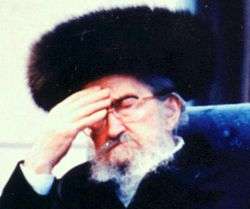Sholom Noach Berezovsky
Rabbi Sholom Noach Berezovsky (Hebrew: שלום נח ברזובסקי; August 8, 1911 – August 8, 2000) served as Slonimer Rebbe from 1981 until his death. He is widely known for his teachings which he published as a series of books entitled Nesivos Sholom.

Rabbi Berezovsky was a prolific writer. Through his writings he was among the most influential of contemporary chasidic rebbes, among chasidim and non-chasidim alike. A leading non-chasidic rosh yeshiva has referred to the Nesivos Sholom as the "Mesillat Yesharim of our times".
Biographical details
Sholom Noach was born on 18 August 1911 (4 Av 5671 in the Hebrew calendar) in Baranovitsh (today in Belarus), to his father, Moshe Avrohom, head of the local Jewish community and his mother, a granddaughter of Hillel, a brother of the first Slonimer rebbe, known by the title of his work Yesod Ho'Avoda.
In 1933 he married a daughter of Rabbi Avrohom Weinberg of Tverya, later to become Slonimer Rebbe (Bircath Avrohom).
Torah and Hasidic approach
Sholom Noach studied in the Slonimer yeshiva Toras Chessed in Baranovitsh. The rosh yeshiva, Rabbi Avrohom Shmuel Hirshovitz was a grandson of Rabbi Eliezer Gordon of Telz, and its mashgiach, Rabbi Moshe Midner was a grandson of the Yesod Ho'Avoda and a student of Rabbi Chaim Soloveitchik; the Yeshiva thus combined the Lithuanian Talmudic style of the Misnagdic yeshivas with the Hasidic approach.
In approximately 1930, the then-Slonimer Rebbe appointed Sholom Noach to commit to memory and subsequently write up the discourses which he (the Rebbe) delivered every Shabbos. These notes were subsequently published under the name Beis Avrohom.
In 1940, Rabbi Sholom Noach was appointed rosh yeshiva of Achei Temimim, the Lubavitcher yeshiva in Tel Aviv. In 1941 he opened the Slonimer yeshiva in Jerusalem with just five students. On Friday nights rabbi Berezovsky would sit with the students for hours on end, teaching them the traditional Slonimer melodies.
The Slonim Hasidic dynasty was virtually wiped out in the Holocaust; the yeshiva in Jerusalem served as the focus for its revival. As part of his effort to rejuvenate Slonimer chasidus, Rabbi Sholom Noach was responsible for collecting the oral traditions ascribed to previous Slonimer rebbes (who did not commit their teachings to writing) in works such as Divrei Shmuel and Toras Ovos.
In 1954, Rabbi Berezovsky's father-in-law agreed to assume the mantle of the Rebbe. Rabbi Sholom Noach wrote up his discourses, too; they were subsequently published as Birkas Avrohom.
Rabbi Sholom Noach also authored many volumes of his own teachings, including his magnum opus, the seven-volume Nesivos Sholom (1982) as well as numerous smaller works on educational issues, marital harmony and other issues.
He succeeded his father-in-law as Slonimer Rebbe following the latter's death in 1981, serving in that capacity for almost twenty years.
He is succeeded by his son, Rabbi Shmuel.
Sources
Hamodia, August 18, 2000, p. 24 and Marbitzei Torah Me'olam Ha'chasidut Vol. I, p. 177 and Vol. III, p. 167, quoted in Hama'yan